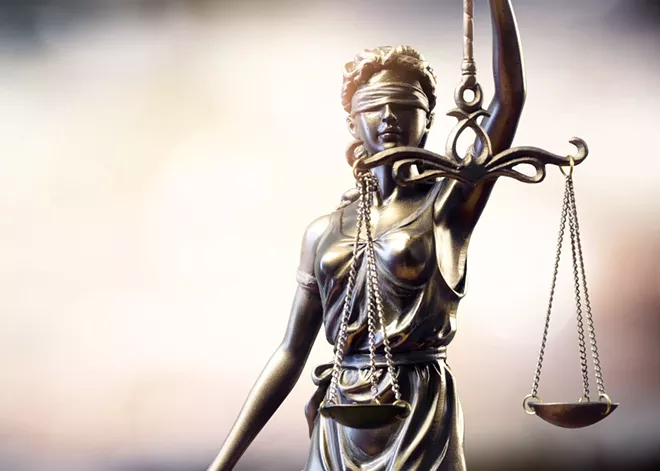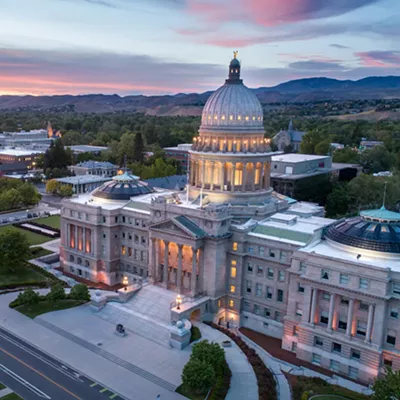
In 2015, Tracy Tucker sat in a Bonner County courtroom facing allegations of attempted strangulation and domestic battery in the presence of a child. He was assigned a public defender, but no defense attorney was present at his first appearance, where his bail was set at $40,000 — an amount Tucker couldn't afford.
As his case moved forward and Tucker remained in custody for three months, he tried to call his defense attorney 50 times but received no response, according to court documents. He says he ultimately communicated with his attorney for about 20 minutes across three meetings — two of which were during court appearances for his case. Tucker pleaded guilty and was sentenced to a suspended prison term of two years.
His case and others like it would become the catalyst for major changes to the Idaho criminal justice system that are set to take effect this year.
The ACLU of Idaho worked with Tucker, Jason Sharp, Naomi Morley and Jeremy Payne, who each alleged similar violations of their right to representation at key stages of their cases. On June 17, 2015, they filed a class-action lawsuit against the state of Idaho on behalf of all "indigent" defendants who can't afford their own attorney.
The case alleged that Idaho's indigent public defense system is unconstitutional. Namely, the case pointed to issues with county-provided defense around the state, including "extraordinarily high caseloads and workloads," the use of fixed-fee contracts, a lack of effective communication with clients, inadequate or nonexistent case investigation, and more. The case continued through various appeals over the last nine years.
To address the issues the case raised, Idaho Gov. Brad Little signed House Bill 735 into law in 2022 to move the funding of public defense from the county to the state level, and House Bill 236 in 2023 to create the State Public Defender office.
The new office, led by State Public Defender Eric Fredericksen, is set to take over indigent public defense on Oct. 1. It will standardize public defense in Idaho and move away from a "patchwork" county-level system. The goal is to have universal hourly pay rates for contracted attorneys, track the time per case with a new management system, and balance caseloads for public defenders, with experienced attorneys in seven judicial districts overseeing defense across multiple counties.
However, even with the state working to address issues with the old system, the ACLU of Idaho, public defenders, prosecutors and other stakeholders say the new system is already creating concerns. Critics argue that the shift is taking place too hastily and that the state's standardized pay rates will create even more issues with hiring and maintaining defense attorneys.
Anne Taylor, the former chief of Kootenai County's Public Defender's Office, says she fears the harm that will come to those who can't afford an attorney.
"They won't have enough responsive counsel," Taylor says.
CONSTITUTIONAL RIGHT
The Sixth Amendment to the U.S. Constitution guarantees the right to defense counsel. Through multiple decisions in the 20th century, the U.S. Supreme Court expanded on the right, requiring states to provide attorneys for misdemeanor cases and to ensure that public defenders have adequate time to represent their clients.In 2009, the Idaho Criminal Justice Commission contracted the National Legal Aid and Defender Association to study Idaho's trial-level indigent defense services in Ada, Blaine, Bonneville, Canyon, Kootenai, Nez Perce and Power counties. In 2010, the association's report concluded "that none of the public defender systems in the sample counties are constitutionally adequate."
The report stated that flat-fee contracts created ethical concerns about proper representation in conflict with attorneys' financial interests. A flat-fee contract may be a one-time payment for complete representation during a case, motivating defense attorneys to resolve cases quickly by encouraging defendants to take a plea deal. At the time, public defenders also had caseloads that were 322% of what national standards allow, and funding for investigators and support staff was insufficient for public defense, according to the report.
In response, state lawmakers created the Idaho Public Defense Commission in 2014, with the goal of collecting data on caseloads and expenditures, supporting compliance with national standards, and providing training. The commission would also make recommendations to the state Legislature. Lawmakers also moved away from county fixed-fee contracts and removed two-year minimum terms for public defenders.
Arguably, the commission lacked the ability to reform public defense, says Ritchie Eppink, legal director for the ACLU of Idaho.
"The statewide Public Defense Commission had essentially no authority to do anything about the system; it made recommendations to the Legislature, and it provided some training," Eppink says, "but beyond that, had no significant power."
Taylor, who was the chief Kootenai County public defender from 2017 until earlier this year, says that although the Public Defense Commission had mixed results, it did help address some issues in Kootenai County.
"There were a lot of good things that came out of that, and in my view, some negative things, but the good things were that there was additional funding," Taylor says. "And a look at the caseloads meant that more funding came in specifically earmarked to hire more lawyers, to spread the workload."
PAYING FOR PUBLIC DEFENSE
Christopher Schwartz has spent the last 20 years as the head public defender in Shoshone County and as a conflict public defender in Kootenai County. A conflict public defender is contracted to represent individuals if there are conflicts of interest between attorneys, or multiple defendants involved in one case.Schwartz says public defenders have always received less pay and benefits than prosecutors, making it challenging to hire and retain attorneys. He says that prosecutors can often retire 10 years earlier and, on average, receive an additional 10% in pay. Many new attorneys join county public defender offices to gain valuable experience, but don't stay long.
"It's not uncommon that you have someone that's a [public defender] for one or two, three years," Schwartz says, "[using] the public defender system to kind of learn how to do the law, and then they leave."
In 2022, Kootenai County increased the hourly rates for conflict public defenders to $150 an hour and allowed them to bill the county $50 an hour for support staff, Schwartz says.
The same year, Kootenai County Prosecutor Stanley Mortensen collaborated with the county Public Defender's Office to address the high cost of living in the county by asking the Board of County Commissioners to increase staff attorney wages. Still, Mortensen says the last time he checked, his office was down seven attorneys, and the public defender's office was short-staffed by 11 attorneys.
"The commissioners approved wage increases," Mortensen says. "I started hiring prosecutors almost immediately, but the public defender's office couldn't hire anybody because this law had been passed, and the law left more questions unanswered than they answered."
CENTRALIZED AUTHORITY AND WAGES
Idaho's new State Public Defender Office is being led by Fredericksen, who had previously worked as a state appellate public defender since his appointment in 2016 by former Gov. Butch Otter.Under the new funding mechanism, county taxpayers no longer pay for public defenders via property taxes. Instead, the state is using sales tax from online purchases to pay for that work, and lawmakers appropriated $49 million to cover the costs for fiscal 2025, which started July 1.
The new structure maintains 14 counties' public defender offices, with the state footing the bill. Ada, Bannock, Blaine, Bonner, Bonneville, Canyon, Gooding, Jefferson, Kootenai and Twin Falls counties each have established public defender offices. Minidoka and Cassia counties have a combined office, as do Power and Oneida counties.
Kootenai's office will be the headquarters for the First Judicial District, which covers North Idaho, and Bonner County will maintain its office. Thirty counties in the state don't have public defender offices and will continue to hire private attorneys for public defense work, but those contracts will now be with the state.
The Idaho State Public Defender's website states that contract and conflict attorneys will make $100 per hour and lead counsel on capital cases will make $150 an hour. The office claims that 77% of public defenders in the state will receive a salary increase, 15% will receive a decrease in pay, and the rest will stay at the same rate.
When reached by phone on Aug. 9, Fredericksen says his office is standardizing rates, and the new management system, LegalServe, will allow public defenders to track their hours and caseload, allowing for more balance.
"We went across the state to establish a baseline and make sure we had fair pay for attorneys and staff across the state," Fredericksen says. "It wasn't just based on attorneys in Ada County, it was across the state, and right now, everybody has fair pay based on their years of experience as an attorney."
However, many First District (Bonner, Boundary, Kootenai and Shoshone counties) contract attorneys are concerned about receiving a pay reduction for the same level of work. Nine attorneys voiced pay concerns in a letter to Fredericksen in May.
"Your office made the decision to cut the pay rate for all contract attorneys by 33% and to eliminate our ability to bill for our assistants' time," the letter states.
Schwartz and eight other attorneys stated in the letter that they want to stay at the rate they achieved in 2022: $150 per hour, with the ability to bill for staff. They claim that the state's decision doesn't reflect the cost of living in Kootenai County, which will make it even harder to attract and retain attorneys.
The nine attorneys, who collectively are working over 1,000 cases, have stated they will withdraw from North Idaho's pool of conflict attorneys.
"We cannot accept your proposal and hereby provide notice to the Kootenai County Court system that the undersigned attorneys are withdrawing from the First District Conflict program," the letter states.
Fredericksen says his team has started the process of going to job fairs and building interest among new attorneys. He says that many attorneys would enjoy moving to North Idaho because of the beautiful environment.
BRACING FOR IMPACT
In his role as the legal director for the ACLU of Idaho, Eppink says he has heard many rumblings about how disastrous the rollout of the statewide office will be. He says he's heard of attorneys declining the new rate, including senior public defenders, who will see a 10% to 30% pay cut."What I fear is we're going from a disaster and a crisis to an absolute collapse of this system — which is going to present problems all across the board, for judges, prosecutors, and, of course, for the Idahoans who are being charged with crimes," Eppink says.
Schwartz says the shortage of public defenders in county offices across the First Judicial District led to the use of many conflict attorneys because of the sheer volume of cases.
"We represent, I don't know, 30 to 40% of the criminal cases that people get a [public defender] on in Kootenai County," Schwartz says, "because the Kootenai County [Public Defender's] office has been so short-staffed that they've had to conflict cases based purely on having too many cases, not because there's really a conflict."
Prosecutors like Mortensen are concerned about the need to delay hearings and the possibility of cases getting dropped if there aren't enough defense attorneys under the new system.
"I can't predict what the courts are going to do — that's up to them," Mortensen says. "But you're going to have a lot of defendants making motions to be released and a lot of defendants making motions to have their cases dismissed if they're experiencing delays because of a lack of attorneys."
Mortensen is also worried about how the rollout will impact victims, particularly if charges are dropped.
Taylor is a seasoned public defender and one of the most notable Idaho defense attorneys due to her high-profile cases. Now in private practice, she is still a defense attorney for Bryan Kohberger, the suspect charged with the murder of four University of Idaho students in Moscow.
At Idaho legislative hearings in 2023, she was sounding alarms about the proposed public defender system being underfunded, and was vocal about the need to retain the attorneys the state already has.
"My concerns were that it was underfunded and people who serve the clients would be harmed, and therefore the clients would be harmed," Taylor says. "And I felt like their timeline was way too fast to try to put it together. It needed more money, more time and more protections for the clients and for the people who serve the clients."
Taylor resigned this summer from her role as a Kootenai County public defender. The decision was not made lightly, as Taylor says she found her dream job working as a public defender in Kootenai County and always thought she would retire in that position.
Taylor says that no one is asking to be able to afford a lake house, but attorneys deserve adequate pay to support their staff, cover their expenses and focus on their defendants.
"They need job security, they need to know what's going on, and they need to be paid what they're worth," Taylor says. "And they need not to be overworked so that they can serve the clients." ♦


























